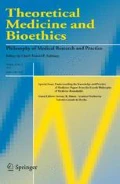Abstract
Previous papers on ethics consultation in medicine have taken a positivistic approach and lack critical scrutiny of the psychosocial, political, and moral contexts in which consultations occur. This paper discusses some of the contextual factors that require more careful research. We need to know more about what prompts and inhibits consultation, especially what factors effectively prevent house officers and nonphysicians from requesting consultation despite perceived moral conflict in cases. The attitudes and institutional power of attending medical staff seem important, especially where innovative interventions raise ethical questions. Ethics consultants also need to address the thorny problems of the origin(s) of the consultant's authority, whistleblowing, conflicts of interest that affect the consultant, persistently poor communications in hospitals, systemic inequity in the availability or quality of services for some, and the standing of the consultant's recommendations, including their appearance in the patient's medical record.
Similar content being viewed by others
References
Grodin MA, Markley WS, McDonald AE. Use of an institutional ethics team on a pediatric service. QRB 1985;11:16–9.
LaPuma J. Consultations in clinical ethics — issues and questions in 27 cases. West J Med 1987;146:633–7.
LaPuma J, Stocking CB, Silverstein MD, Dimartini A, Siegler M. An ethics consultation service in a teaching hospital: utilization and evaluation. JAMA 1988;260:808–11.
Perkins HS, Saathoff BS. Impact of medical ethics consultations on physicians: an exploratory study. Am J Med 1988;85:761–5.
Wear S, Katz P, Andrzejewski B, Haryadi T. The development of an ethics consultation service. HEC Forum 1990;2:75–87.
White M. Feasibility Study to Evaluate the Ethics Consultation Service at the University of Virginia Medical Center. Charlottesville, VA: Center for Biomedical Ethics, University of Virginia, 1989 (unpublished manuscript).
Thomasma DC. Legitimate and illegitimate roles for the medical ethicist. In: Ackerman TF, Graber GC, Reynolds CH, Thomasma DC, eds. Clinical Medical Ethics: Exploration and Assessment. Lanham, MA: University Press of America 1987:83–94.
Sullivan P. Philosophers have no place at bedside, physician-lawyer maintains. Can Med Assoc J 1989;140:1194–5.
Ruddick W. Can doctors and philosophers work together? Hastings Cent Rep 1981;11(April):12–7.
Purtilo RB. A comment on the concept of consultation. In: Fletcher JC, Quist N, Jonsen AR, eds. Ethics Consultation in Health Care. Ann Arbor, MI: Health Administration Press, 1989:99–108.
Siegler M. Ethics committees: decisions by bureaucracy. Hastings Cent Rep 1986;16(June):22–4.
LaPuma J, Toulmin SE. Ethics consultants and ethics committees. Arch Intern Med 1989;149:1109–12.
Purtilo RB. Ethics consultations in the hospital. N Engl J Med 1984;311:983–6.
Rothenberg LS. Clinical ethicists and hospital ethics consultants: the nature of the “clinical” role. In: Fletcher JC, Quist N, Jonsen AR, eds. Ethics Consultation in Health Care. Ann Arbor, MI: Health Administration Press, 1989:19–35.
Ackerman TF. Conceptualizing the role of the ethics consultant: some theoretical issues. In: Fletcher JC, Quist N, Jonsen AR, eds. Ethics Consultation in Health Care. Ann Arbor, MI: Health Administration Press, 1989:37–52.
Siegler M, Singer PA. Clinical ethics consultation: Godsend or “God squad?” Amer J Med 1988;85:759–60.
Siegler M. Cautionary advice for humanists. Hastings Cent Rep 1981;11(April):19–20.
Jonsen AR. Watching the doctor. N Engl J Med 1983;308:1531–5.
Bosk C. The fieldworker as watcher and witness. Hastings Cent Rep 1985;15(June):10–4.
Agich GJ. Clinical ethics: a role theoretical look. Soc Sci Med 1990;30:389–99.
Davis AJ. Ethics consultation with hospital employees in complex medical settings. In: Fletcher JC, Quist N, Jonsen AR, eds. Ethics Consultation in Health Care. Ann Arbor, MI: Health Administration Press, 1989:109–16.
Wassersug JD. Invasion of the ethicists. MD 1988;(April):28–34.
Moore FD. The desperate case: CARE (costs, applicability, research, ethics). JAMA 1989;261:1483–4.
Fox RC, Swazey JP. The clinical moratorium. In: Fox RC, ed. Essays in Medical Sociology: Journeys into the Field. 2nd ed. New Brunswick, NJ: Transaction Books, 1988:325–63.
Robertson JA. Clinical medical ethics and the law: the rights and duties of ethics consultants. In: Fletcher JC, Quist N, Jonsen AR, eds. Ethics Consultation in Health Care. Ann Arbor, MI: Health Administration Press, 1989:157–72.
Fletcher JC. Ethics consultation services: an overview. Biolaw 1990;2(Special Sections):S339–47.
Author information
Authors and Affiliations
Rights and permissions
About this article
Cite this article
Frader, J.E. Political and interpersonal aspects of ethics consultation. Theor Med Bioeth 13, 31–44 (1992). https://doi.org/10.1007/BF00489218
Issue Date:
DOI: https://doi.org/10.1007/BF00489218




